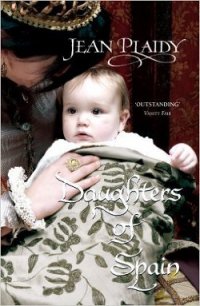Katharine, The Virgin Widow - Plaidy Jean (книга регистрации .txt) 📗
Now he was only waiting to hear from Naples. His own marriage was of more urgency than that of his son.
Out into the June sunshine of Fleet Street came a satisfied King, a sullen Prince and an apprehensive Princess.
* * *
NOW THAT KATHARINE was formally betrothed to the Prince of Wales, she could not be allowed to live in seclusion at Durham House, and life became more interesting for her.
The maids of honor were delighted by the turn of events because it meant that now they could go occasionally to Court. There was activity in their apartments as they hastily reviewed their wardrobes and bewailed the fact that their gowns were shabby and not of the latest fashion.
Katharine was upset. Badly she needed money. Her parents had written that they could send her nothing, because they needed everything they could lay their hands on to prosecute the war, and military events were not going well for Spain. Katharine must rely on the bounty of her father-in-law.
It had been uncomfortable having to rely on the bounty of a miser. And it was the fact that she was unable to pay her servants that had upset Katharine most.
But now that she was betrothed to his son, the King could no longer allow her to live in penury, and grudgingly he made her an allowance. This was relief, but as it was necessary to maintain a large household, and debts had been steadily mounting, the allowance was quickly swallowed up, and although the situation was relieved considerably, comparative poverty still prevailed at Durham House.
Dona Elvira was the only one who resented the change. She was jealous of her power and was becoming anxious to settle the matter of Maria de Rojas and Inigo.
It was all very well to prevent letters, concerning Maria’s hoped-for marriage to the grandson of the Earl of Derby, from reaching the Sovereigns, but this was not arranging a match between Maria and Inigo.
She had given Inigo full power over the pages and he was continually seeking the company of the maids of honor—Maria de Rojas in particular. He was not popular however and Hernan Duque complained of his insolent manner.
This infuriated Elvira, who promptly wrote off to Isabella declaring that, if she were to be responsible for the Infanta’s household, she could not have interference from their Highnesses’ ambassadors and envoys.
Isabella, who put complete trust in Elvira as her daughter’s guardian, wrote reprovingly to Hernan Duque; and this so delighted Elvira that she became more domineering than ever.
Katharine was growing weary of Elvira’s rule. She was no longer a child and she felt that it was time that she herself took charge of her own household. She began by commanding Juan de Cuero to hand over some of her plate and jewels, which she pawned in order to pay her servants’ wages.
When Elvira heard of this she protested, but Katharine was determined to have her way in this matter.
“These are my jewels and plate,” she said. “I shall do with them as I will.”
“But they are part of the dowry which you will bring to your husband.”
“I will use them instead of the revenues I was to have received from my late husband,” answered Katharine. “The jewels and plate will not be needed until I am married to the Prince of Wales. Then I shall receive an amount similar to that which I have had to renounce. I shall redeem the jewels with that.”
Dona Elvira could not believe that her hold on Katharine was slackening, nor that it was possible for her to be defeated in any way.
So she continued, as determined as ever to govern the household, not realizing that Katharine was growing up.
* * *
KATHARINE FOUND Maria de Rojas in a state of despondency.
“What ails you, Maria?”
Maria blurted out that she had met her lover at the Court and that he was less ardent.
“What could one expect?” demanded Maria. “All this time we have waited, and your mother ignores your requests on my behalf.”
“It seems so very strange to me,” said Katharine. “It is unlike her to ignore such a matter, for she would clearly see it as her duty to look to the welfare of my attendants.”
Katharine pondering the matter remembered that Inigo was hoping for Maria, and that Dona Elvira approved of his choice. That was certain, for he would never have dared show it if that had not been so.
Katharine said slowly: “I will write to my mother again, and this time I will send the letter by a secret messenger—not through the usual channels. It has occurred to me, Maria, that something—or someone—may have prevented my mother from receiving those letters.”
Maria lifted her head and stared at her mistress.
Understanding dawned in Maria’s eyes.
* * *
THE LETTER WAS WRITTEN; the secret messenger was found. A few days after he had left—far too soon to hope for a reply to that letter—Katharine, seated at her window, saw a courier arrive and knew that he brought dispatches from Spain.
It was six months since her betrothal to Henry in the Bishop of Salisbury’s house in Fleet Street, and now that she had become accustomed to the idea that she must marry young Henry she had come to terms with life. The slight relief which the new turn of affairs had brought to her living standards was welcome, and life was far more tolerable.
She found that she could speak English fairly fluently now, and as she grew accustomed to her country of adoption she was even growing fond of it.
News from Spain always made her heart leap with hope and fear; and this message was obviously an important one. There was an urgency about the courier as he leaped from his saddle and, not even glancing at the groom who took his horse, hurried into the house.
She did not wait for him to be brought to her, but went down to meet him. She was determined now that letters should come direct to her, and that they should not first pass through the hands of Dona Elvira.
She came into the hall and saw the courier standing there. Dona Elvira was already there. The courier looked stricken, and when she saw that Dona Elvira had begun to weep, a terrible anxiety came to Katharine.
“What has happened?” she demanded.
The courier opened his mouth as though he were trying to speak but could not find the words. Dona Elvira was holding a kerchief to her eyes.
“Tell me…quickly!” cried Katharine.
It was Dona Elvira who spoke. She lowered her kerchief and Katharine saw that her face was blotched with tears, and that this was no assumed grief.
“Your Highness,” she began. “Oh…my dearest Highness…this is the most terrible calamity which could befall us. How can I tell you…knowing what she meant to you? How can I be the one?”
Katharine heard her own voice speaking; she whispered: “Not…my mother!”
There was no answer, so she knew it was so. This was indeed the greatest calamity.
“She is sick? She is ill? She has been sick for so long. If she had not been sick…life would have been different here. She would never have allowed…”
She was talking…talking to hold off the news she feared to hear.
Dona Elvira had recovered herself. She said: “Highness, come to your apartment. I will look after you there.”
“My mother…” said Katharine. “She is…”
“God rest her soul!” murmured Elvira. “She was a saint. There will be rejoicing in Heaven.”
“It is so then?” said Katharine piteously. She was like a child pleading: Tell me it is not so. Tell me that she is ill…that she will recover. What can I do if she is not there? She has always been there…even though we were parted. How can I live with the knowledge that she is gone…that she is dead?
“She has passed peacefully to her rest,” said Dona Elvira. “Her care for you was evident right at the end. The last thing she did was to have the Bull of Dispensation brought to her. She knew before she died that an affinity with Arthur could not stand in the way of your marriage with Henry. She satisfied herself that your future was assured and then…she made her will and lay down to die.”




